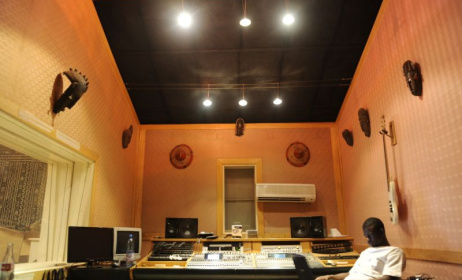The recording industry
The recording of sound is one of the greatest accomplishments in human history. Like television and photography, it has given people the means to etch into the collective consciousness their historical achievements, and many downfalls.
 South African band Native Young have made a name for themselves with their elaborate, and often unusual, production and recording techniques.
South African band Native Young have made a name for themselves with their elaborate, and often unusual, production and recording techniques.
Without the recording of sound we would never have known what the leaders of countries during WWII – like Hitler, Stalin and Churchill – sounded like, and we would have had to trust in our elders' exaggerated myths to get a sense of what these characters were like in real life. Chances are that by now, without the advent of moving pictures and recorded sounds, Churchill would be known as a colossus who could eat a dozen wild boar in one sitting, Hitler could topple Polish cathedrals with his bare voice and Stalin would hoist the Caucasus Mountains over his shoulders when irritable.
Apart from sound recordings' ability to give us objective truth, they have also served as a means to bring us closer to nature and bygone cultures. Today we can listen to the songs of extinct birds that will never fly or sing again. In the same breath, we can listen to the singers and musicians of yesteryear, many of whom sang in languages and inflections that would have been forgotten forever had their voices or instruments never been captured. Even music archiving would not have progressed as far as it has today without the aid of recording devices. Otherwise we would be wondering what Fela Kuti might have sounded like just like we ponder about Vivaldi's playing style beyond his written notes, which can be seen in Turin’s Biblioteca Nazionale, but not heard in their truest form.
Sound recordings have also created an incredible profession: sound engineering. And the best thing about it is that technology has made it possible for anyone interested in recording sound to do so from the comfort of their relatively inexpensive devices; there are thousands of indie bands around the world releasing full albums recorded on iPhones, or with the help of music-production apps available on virtually any handheld device.
Ultimately it is the recording of sound that has given rise to the music industry as we know it, which apart from its many criticisms has taken music from the imaginations of artists directly to our homes.
Music In Africa has commissioned and published Overview Texts that cover the historical development of the recording industries of various African countries, with many more still to come. We will also add news and features that are complementary to our theme as the month of October progresses. Make sure you check in every day for useful information pertaining to the Recording Industry in Africa.
Overview Texts
- The recording and publishing industry in Botswana
- The recording industry in Chad
- The recording industry in Zambia
- The recording industry in Swaziland
- The recording industry in Mauritius
- The recording industry in Eritrea
- The recording industry in Ethiopia
- The recording industry in Togo
- The recording industry in Malawi
- The history of Zimbabwe's recording industry
- The Gambian recording industry
- The recording and video industries in Uganda
- The recording industry in Rwanda
- The recording industry in Tanzania
- The recording industry in Ghana
- Recording, performing and royalties in Senegal
- The South African recording and publishing industries
Also be sure to check out the Music In Africa directory for recording services in Africa:


























Comments
Log in or register to post comments